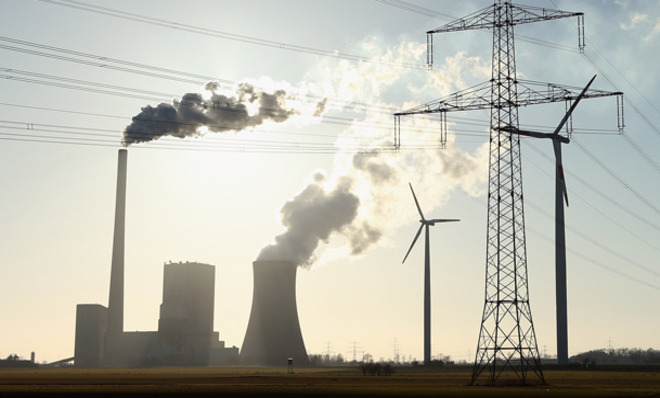Technology — not politics — is likely the answer to climate change
Our capacity for innovation has gotten the human race out of scrapes in the past

A free daily email with the biggest news stories of the day – and the best features from TheWeek.com
You are now subscribed
Your newsletter sign-up was successful
In the five years that President Obama has been in office, Congress has stymied hopes that the U.S. government will make significant progress in reducing the country's greenhouse gas emissions. Meanwhile, on an international level, the prospect of reaching a successor to the Kyoto Protocol seems frustratingly elusive.
Cass Sunstein, a Harvard Law professor and a former White House official, claims that the debate on climate change is being muddied by two groups of people — eco-doomsayers and techno-optimists.
Sunstein thinks that these two camps can be characterized by two people: Paul Ehrlich and Julian Simon, respectively:
The Week
Escape your echo chamber. Get the facts behind the news, plus analysis from multiple perspectives.

Sign up for The Week's Free Newsletters
From our morning news briefing to a weekly Good News Newsletter, get the best of The Week delivered directly to your inbox.
From our morning news briefing to a weekly Good News Newsletter, get the best of The Week delivered directly to your inbox.
Paul Ehrlich is a Stanford University biologist whose lifelong concern has been overpopulation. In the 1960s and 1970s, he issued dire warnings, most prominently in his 1968 best-seller, The Population Bomb. Ehrlich argued that population growth would place increasing strains on the planet’s natural resources, creating forms of scarcity that would produce widespread human suffering. Notwithstanding his personal ebullience, Ehrlich warned of "famines of unbelievable proportions" occurring by 1975 and of "hundreds of millions of people" starving to death in the 1970s and 1980s.
Ehrlich’s great adversary was Julian Simon, an economist at the University of Illinois. Shy and awkward, Simon suffered from depression for more than a decade. But with respect to humanity’s future, he was an optimist. Simon believed that because of free markets and technological ingenuity, population growth need not entail scarcity. [Bloomberg]
Sunstein goes so far as to label both groups "extremists," saying they have "derailed" attempts to have a reasonable national discussion about environmental issues. Facing an array of environmental decisions, he writes, "the noisy, headline-grabbing dogmas of Paul Ehrlich and Julian Simon are a serious impediment to progress. The coming decisions will require careful exploration of costs and benefits, not abstract narratives about the supposed arc of history."
Now, the ideas of eco-doomsayers have had a difficult history. From their intellectual grandfather in the 19th century, the British economist Thomas Malthus — who predicted mass starvation in Britain based on a flawed belief that populations grow much faster than the capacity of the land to produce food — eco-doomsayers have consistently underestimated our ability to innovate our way out of trouble.
But characterizing techno-optimists as extremists is kind of silly. Techno-optimists believe that the best way to deal with environmental problems is via technological and social innovation. Sunstein is essentially placing his faith in political agreements as a means to reduce carbon emissions and minimize the impact of climate change. But the agricultural revolution — to name just one example, which averted the doomed prophecies of Thomas Malthus — was driven by farmers and scientists developing better agricultural technology and increased food yields. The agricultural revolution was not a product of international conferences and treaties.
With every passing climate conference, the difficulties of forging an international consensus to get people to change their behavior have become crystal clear. The underlying truth is that most countries — from developing nations like China, to developed nations like the United States — don’t want to sacrifice their economic growth for the sake of fighting climate change. Sunstein can appeal for a rational debate, but it’s hard to change the fact that Americans consider preventing global warming the country's lowest political priority.
A free daily email with the biggest news stories of the day – and the best features from TheWeek.com
That’s where the techno-optimists come in. Techno-optimists don’t want to change people’s behavior with laws. They want to change it by developing technology that will provide people with cleaner and cheaper energy. And there are real reasons to be optimistic: In the last 40 years, for example, the price of solar panels has fallen over 99 percent, and the technology only keeps improving.
With renewable energy prices falling so rapidly, storage technologies for such energy is finally becoming viable. Meanwhile, the cost of fossil fuel extraction is on a long-term rising trend, which means we’re getting close to the point where people will start switching to renewable energy because it’s cheaper.
That’s much more important to the vast majority of people than low carbon emissions. Who doesn't love cheap, readily available energy?
The political attempts to regulate away carbon emissions will continue. But the real progress on the issue is coming in the form of technology.
John Aziz is the economics and business correspondent at TheWeek.com. He is also an associate editor at Pieria.co.uk. Previously his work has appeared on Business Insider, Zero Hedge, and Noahpinion.
-
 How to Get to Heaven from Belfast: a ‘highly entertaining ride’
How to Get to Heaven from Belfast: a ‘highly entertaining ride’The Week Recommends Mystery-comedy from the creator of Derry Girls should be ‘your new binge-watch’
-
 The 8 best TV shows of the 1960s
The 8 best TV shows of the 1960sThe standout shows of this decade take viewers from outer space to the Wild West
-
 Microdramas are booming
Microdramas are boomingUnder the radar Scroll to watch a whole movie